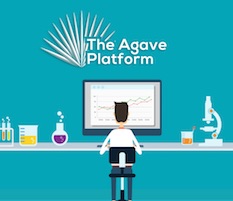 Work began recently on the Agave Platform, an open ‘Science-as-a-Service’ (ScaaS) cloud platform for reproducible science. Funded by a $4 Million NSF grant, the Agave Platform will leverage the success of what originated in 2011 as a set of hosted, web-based application programming interfaces (APIs) for plant biologists under the NSF iPlant project. Since that time, Agave has evolved into a viable software platform for researchers and developers in all domains of science.
Work began recently on the Agave Platform, an open ‘Science-as-a-Service’ (ScaaS) cloud platform for reproducible science. Funded by a $4 Million NSF grant, the Agave Platform will leverage the success of what originated in 2011 as a set of hosted, web-based application programming interfaces (APIs) for plant biologists under the NSF iPlant project. Since that time, Agave has evolved into a viable software platform for researchers and developers in all domains of science.
With this award, we will answer the question of how to easily and affordably put together a web-based infrastructure for a sustainable, on-demand and interactive gateway,” said Rion Dooley, a research associate at TACC and principal investigator (PI) of a new grant to explore this area.
Dooley says that everyone with an email account should be familiar with the Science-as-a-Service model, but that’s not quite the right fit for the research community. “The needs of researchers don’t fit into a tidy little box,” Dooley said. “We believe the Agave Platform will solve many of these issues by quickly closing the capability gap between academic and commercial infrastructure. This is our way to solve the problem for the computational science sector. We want this to be a web platform that helps the entire open science community realize their research goals and allows their ideas to be heard.”
Rajiv Ramnath, a program director in the Division of Advanced Cyberinfrastructure and the cognizant program officer for the Agave Platform said, “The project will enable the academic and research community to avail itself of what should become standard technology.” He added, “The project team is made up of skilled developers, communicators and educators, and I look forward to successful outcomes from the project.”
While the Agave APIs were originally developed to power cyberinfrastructure for the plant biology community through iPlant, they have gained steady traction with researchers in other communities searching for simple, affordable ways to enable, accelerate and reproduce their science. Growing steadily since its initial release, the community driven design of the APIs allow Agave to deliver tangible value to nearly 20,000 researchers across five continents.
Building upon the success of the existing Agave Developer APIs, this new project includes three efforts, which will synergistically evolve the current technology into a sustainable ScaaS platform for the national research community:
- The Agave Platform APIs — The existing Agave developer APIs will expand to offer additional science APIs and management interfaces leading to a cohesive, self-provisioning platform that will enable reproducible ScaaS for the developer community and scale the platform to support broad usage from the national research community.
- The Application Exchange (AX) — The project team will partner with commercial and academic institutions to create a community-driven Application Exchange (AX) based on Docker container technology to facilitate application transparency, portability, attribution and reproducibility. The AX presents a highly interoperable, industry approved solution for creating and sharing reproducible science. By leveraging a matching industrial investment, this project will accelerate existing community efforts to create a culture of accountability and openness. This will enable a higher quality and frequency of peer reviewed research and more verifiable science.
- Agave ToGo — The project will consolidate existing open source contributions from projects already with the Agave ecosystem into Agave ToGo, a collection of reference science gateways in multiple languages and web frameworks. When combined with the Agave Platform and the AX, Agave ToGo will enable novice users to create scalable, reproducible, digital labs that span their office, commercial cloud and national data centers in a matter of minutes.
Agave ToGo will make it easy to deploy science on the web,” Dooley said. “Users will be empowered to focus on domain science rather than computer science. Developers will stimulate innovation and increase the opportunity for discovery.”
The cumulative effect of these efforts — combined with the ongoing education and outreach activities in classrooms, coding competitions, workshops and hackathons — will equip a new generation of students with a skillset highly coveted by industrial and academic employers alike.
Aside from Docker Inc., the creators of the container technology behind the AX, the industry partners include Appsoma, a popular science gateway used in the commercial and academic community, and The Center for Open Science, committed to providing ongoing support for the AX portal. In addition, the project will receive guidance from community development and technology transfer experts at Chapman University and The University of Texas at Austin.
“We’re really excited about these partnerships and to build this platform that the community can take and run with,” Dooley said.
In addition to Dooley, the project team includes John Fonner (Co-PI) from the Texas Advanced Computing Center; Gwen Jacobs (Co-PI) from the University of Hawai’i; and Jim Lupo (Co-PI) and Kathy Traxler from Louisiana State University. These team members bring decades of experience in API and science gateway development, community building, workforce development and education. Importantly, they provide a track record of working at the forefront of advanced computing and providing innovative, open source solutions to the academic research community.



